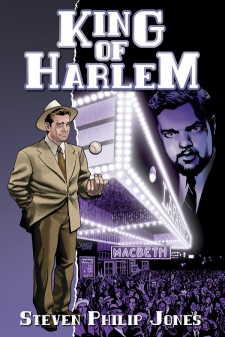 Steven Philip Jones is a writer with a broad body of work, including comics, prose fiction, and non-fiction. His comic books include Talismen: Return of the Exile (Atlantis Studios/www.talismenseries.com); Talismen: “Calling the Kingâ€; Little Dragon: “Albedo 0.39†and “Under the Opaque Skyâ€; Borderman (Gateway Monthly) Reanimator; H.P. Lovecraft in Color; Dracula; Dracula: The Lady in the Tomb; Dracula: The Suicide Club; Invaders from Mars I and II; Carmilla; Street Heroes 2005; Seduction: “Second Stringerâ€; Alien Nation: A Breed Apart; Halloween Horror: “Kin†(Malibu Graphics) Worlds of H.P. Lovecraft ; Nightlinger; Tatters; Sherlock Holmes: Adventure of the Opera Ghost; Sherlock Holmes: The Strange Case of Dr. Jekyll & Mr. Holmes (Caliber Comics), Scales of the Dragon: “Mighty 1â€, “Vanguardâ€; Wolverstone & Davis (Sundragon Comics), and August (Arrow Comics).
Steven Philip Jones is a writer with a broad body of work, including comics, prose fiction, and non-fiction. His comic books include Talismen: Return of the Exile (Atlantis Studios/www.talismenseries.com); Talismen: “Calling the Kingâ€; Little Dragon: “Albedo 0.39†and “Under the Opaque Skyâ€; Borderman (Gateway Monthly) Reanimator; H.P. Lovecraft in Color; Dracula; Dracula: The Lady in the Tomb; Dracula: The Suicide Club; Invaders from Mars I and II; Carmilla; Street Heroes 2005; Seduction: “Second Stringerâ€; Alien Nation: A Breed Apart; Halloween Horror: “Kin†(Malibu Graphics) Worlds of H.P. Lovecraft ; Nightlinger; Tatters; Sherlock Holmes: Adventure of the Opera Ghost; Sherlock Holmes: The Strange Case of Dr. Jekyll & Mr. Holmes (Caliber Comics), Scales of the Dragon: “Mighty 1â€, “Vanguardâ€; Wolverstone & Davis (Sundragon Comics), and August (Arrow Comics).
Whew! Take a breath…
He’s also written novels and novellas, including the mystery adventure King of Harlem (Mundania Press, May 2005) The Bushwhackers (Avalon Books, 2004),
“The Curse of Wrigley Field†in the anthology All About Murder. He also wrote two young adult manuscripts adapting Spawn for Todd McFarland Productions International. His non-fiction includes articles on comics and Sherlock Holmes.
The Iowa-based author’s current projects include a graphic novel adaptation of People that Time Forgot (for Campfire Comics), Worlds of H.P. Lovecraft II, and Sherlock Holmes (both for TransFuzion Studios). You can learn more about Steven and his projects at www.stevenpjones.com.
Question 1: When did you first decide that you wanted to create your own comics for a living?
In 1976 when I turned 16. I had already decided to become a writer, and the year before I fell in love with comics and decided to pursue the medium as a career.
Question 2: Who has had the biggest influence on you outside the comics industry, and how did they affect your life?
My parents. They raised me.
Question 3: Who has had the biggest influence on your comics career, and how has that person changed your work?
Gary Reed. He continued it when it seemed dead, and has been a source of inspiration and encouragement ever since.
Question 4: What do you do to recharge your creative batteries?
Change projects.
Question 5: Describe your typical work routine.
Write as much as I can whenever I can.
 Question 6: What writing, drawing, or other tools do you use?
Question 6: What writing, drawing, or other tools do you use?
Computer, typewriter, reference books, libraries, book shops, friends and acquaintances, internet.
Question 7: What element of your work gives you the most personal satisfaction?
When someone tells me they read something I wrote and liked it. It’s great to know you’ve entertained someone.
Question 8: What has been the most rewarding project in your professional career – in or out of comics – and why?
TALISMEN. It was great to collaborate with someone as talented as Barb Jacobs while having complete creative control of a story we created. And the results were fantastic, mostly due to Barb.
Question 9: We’ve all met very talented newcomers who are trying to get their first professional projects. What’s the best advice you’ve ever heard given to a promising new creator?
If you don’t live, eat and breathe the desire to write (or draw), then find something else to do. Your passion has to be that great to succeed.
Question 10: Time to get philosophical: What’s the most important “big idea” that you’ve learned in life – in or out of comics – and why is it important?
Life is hard, so if opportunities come you’d best pounce on them not matter the difficulties, or later you will wish you had. Most of all, though, nothing is more important than family.
Want more? See the index of “10 Questions” interviews.
Discuss “10 Questions” in the ComicsCareer.Com Forum.
Are you a professional comics creator? Participate in the 10 Questions project.